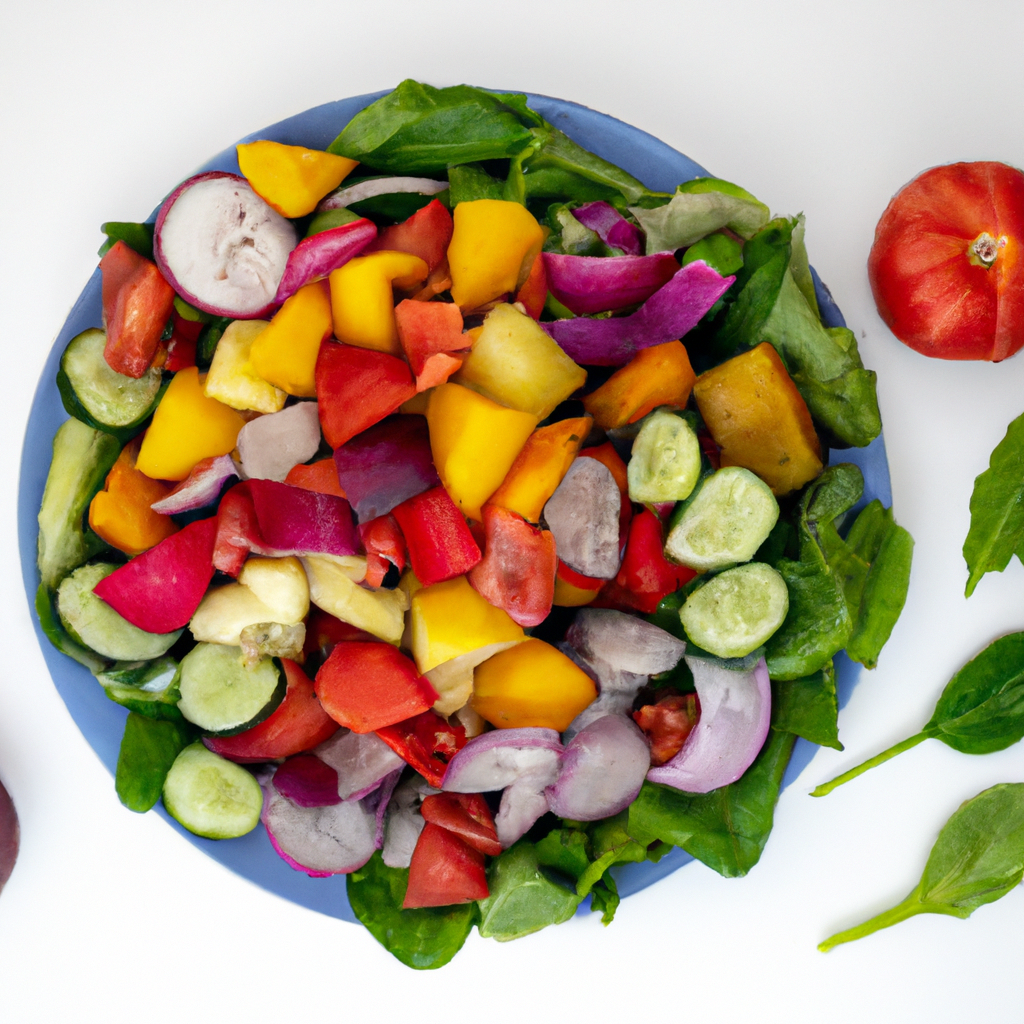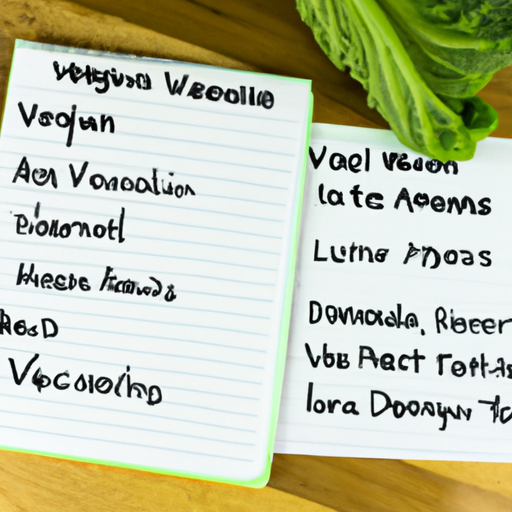Sticking to a healthy and balanced vegan diet can be hard work at times, but for those who are already vegan and who are looking to lose weight in a sustainable way, it’s even more of a challenge. Fortunately, there are some specific strategies that can help you to lose weight while on a vegan diet, without compromising on taste, nutrition, or your overall health. Find out what the top weight-loss strategies for vegans are in this article.
1. Power of a Vegan Diet: Weight Loss Benefits Explored
Veganism is becoming increasingly popular as a way to not only help the environment and animal welfare, but also to improve health and facilitate weight loss. With veganism, the focus remains on whole, plant-based foods that are nutrient-dense and low in calories. Here’s a look at some of the benefits of a vegan diet specifically when it comes to shedding those extra pounds:
- More Fiber, Decreased Calories: It’s clear that the quality of calories matters when it comes to weight loss. With a vegan diet, you are accessing a lot of fiber-rich, low-calorie foods such as vegetables, fruits, legumes, nuts and seeds which can help keep you feeling fuller for longer.
- More Nutrients: If you are reducing calorie intake for weight loss, it’s important to make sure you are still getting the essential nutrients your body needs. A vegan diet is often richer in essential vitamins, minerals, phytonutrients and disease-fighting antioxidants which can all assist with weight loss.
Research shows that compared to non-vegans, vegans may have an easier time losing weight due to the higher content of fiber, minerals, and plant proteins in plant-based foods. Studies have also demonstrated that people who switched to a vegan diet not only lost weight but were also able to maintain their weight loss over a longer period of time when compared to other types of diets.
2. How to Design a Sustainable Vegan Diet Plan
Designing a vegan diet plan can be a challenge. So, if you’re looking to take a healthier, more sustainable approach towards plant-based nutrition, here are a few tips to get you started:
- Consume a variety of whole, unprocessed foods. Try to avoid consuming too many processed vegan foods, such as vegan junk foods and faux meats. Eating a wide variety of fresh produce, legumes, grains, nuts, and seeds will ensure that you get all the essential nutrients needed for a balanced vegan diet.
- Make sure you’re getting enough proteins and calcium. Plant proteins such as legumes, nuts, and whole grains can be good sources of protein, while calcium-rich foods like fortified plant-based milks and tofu can help keep your bones and teeth healthy.
- Focus on eating lots of fiber. Eating whole, unrefined plant foods is a great way to get plenty of dietary fiber. Fiber helps your body digest food, regulate your blood sugar and support healthy gut bacteria.
- Stay hydrated. Staying hydrated is essential for your health. Try and make sure that you’re drinking enough water throughout the day.
Incorporate nutrient-dense vegan superfoods. Consider adding in foods like dark leafy greens, chia and flaxseeds, wheat and barley grass, maca root powder, and spirulina to give your vegan diet plan an extra nutritional boost.
3. Key Nutrients Needed for Healthful Weight Loss
Weight loss is an important goal for many people. Achieving it in a healthful and sustainable way is not always easy though. That’s why it’s important to understand the key nutrients that will help you on the journey.
When trying to maintain a reduced calorie intake to lose weight, it’s important to get the right amount of macronutrients. Protein, Carbohydrates and Fats all have their own essential roles and should be included in meals. High-fiber carbs will also help maintain fullness. Additionally, getting adequate micronutrients is equally important. The essential vitamins and minerals help regulate metabolism, and ward off inflammation. Plus, they are critical for overall health. Here are some of the nutrients to include in your diet:
- Vitamin B6 – helps in nutrient metabolism, boosts immunity
- Vitamin C – supports cell growth and repair
- Zinc – aids in cellular repair, strengthens immunity
- Magnesium – promotes healthy weight loss, supports mental clarity
- Calcium – vital for strong bones, helps in weight-management
- Iron – maintains healthy oxygen in the blood, contributes to energy levels
By understanding and prioritizing these nutrients when creating a diet plan, you will significantly increase your chances of going through a successful weight loss journey.
4. Ways to Minimize Cravings and Fuel Optimal Weight Loss
One of the biggest obstacles when it comes to weight loss is managing cravings and making sure they don’t spiral out of control. Thankfully, there are some tactics you can employ to reduce the intensity of cravings:
- Stay Hydrated: Keeping the body hydrated can not only ease hunger pangs, but can also help clear out the toxins that can build up in your body when on a new diet.
- Focus on Other Habits: If you’re often feeling like you’re craving unhealthy foods, why not substitute that feeling with a different action? Try picking up a hobby or catching up with friends instead.
- Pre-Plan Your Meals: Planning out meals in advance and having something already prepared can be a great way to ensure you don’t give in to cravings. Preparing meals also gives you better control over how much you’re eating.
- Make Diet Tweaks when Necessary: Don’t be afraid to make changes to your current diet if necessary. If are often craving certain foods, add them in small portions to your meals. By doing this you can avoid overindulgence and maintain a balanced diet.
These strategies, coupled with a healthy and consistent diet, will help you stay in control of your cravings and contribute to the long-term success of reaching your weight loss goals.
So, if you’re looking to slim down and stay healthy while following a Vegan lifestyle, the steps outlined in this article can be a great starting place. As long as you’re committed to a healthy and mindful approach to your diet, you can drastically improve your health and shed those extra pounds. Try these strategies and you’ll be well on your way to a healthier you!
Many people are now looking to fruits, vegetables, and plant-based proteins for weight loss. A vegan diet – in which no animal products are consumed – can be an effective option for weight loss, but there are some important strategies to keep in mind.
When it comes to successful vegan weight loss, nutrition is key. High fiber foods, such as whole grains, legumes, nuts, and seeds, are essential for maintaining energy levels throughout the day, as well as helping with digestion and satiation. It’s especially important for vegans to get enough protein; tofu, tempeh, edamame, and legumes are all packed with protein. Additionally, vegans should focus on incorporating plenty of healthy fats into their diet, such as olive oil, avocados, and various nuts and seeds.
In addition to nutritional components, it’s important for vegans to pay attention to portion sizes. Because calories play such a big role when it comes to weight loss, being mindful of serving sizes can be the difference between success and failure. A vegan meal plan should be tailored to the individual and include just enough calories to ensure they are fuelled without exceeding their daily calorie goal.
Finally, vegans should rely on healthy snacks throughout the day in order to avoid overeating at meals. Protein- and fiber-rich snacks like hummus and carrots or a vegan protein bar can help keep hunger at bay. Being prepared with healthy snacks will make it easier to stay on track with vegan eating throughout the day.
In conclusion, following a vegan diet can be an effective weight loss method. But vegans who want to reach their goals must focus on portion sizes, nutrition, and healthy snacking. With the action steps mentioned here, vegans can reach their weight loss goals and reap all the benefits that come with this lifestyle.
